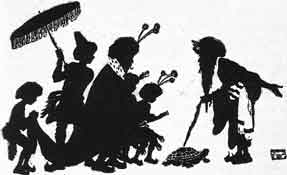Reading Notes: Week 2 Anthology
The Foolish, Timid Rabbit
by Ellen C. Babbit
I enjoyed this story because it actually had some comedy to it, but also a deeper message. Imagine seeing a group of animals just running and proclaiming that the end of the Earth is upon us because it is breaking up. Pretty funny, right? Even if it was breaking up, running would be pointless because there would be no escape from the inevitable. The deeper meaning that I took from this story is that in times of chaos, it is important to evaluate the source of the chaos. Is it really chaos, or is it merely perceived chaos? The rabbit acts on its gut instinct to reaffirm his idea that the world is breaking up without evaluating the action that made the coconut fall from the tree. If he would have, he would have realized the monkeys that were above him dropped the coconut and therefore caused his reaction. His reaction was not something that was from his own doing, rather it was brought about by somebody else. Therefore, the monkey who dropped the coconut had input in how the rabbit reacted. The story also delves into the need for wise people during times of perceived chaos. In this case, the lion, goes back to the beginning and evaluates what happened. By stopping everyone and simply asking questions, he is able to get to the bottom of the issue and calm everyone down.
Two Turtle Jatakas
by Ellen C. Babbitt
I chose this story because I am fascinated with turtles. Also, the underlying themes of the story speak volumes. In The Turtle and the King the turtle is put in a stressful situation. The King and the people around him are discussing how to kill the turtle. Immediately, the turtle could have cried out and begged for mercy, or even better complained when several of the different methods were given on how to kill him. Instead, he held his tongue and waited until the Kings own ignorance played into the hands of the turtle. Ultimately, the turtle was able to survive because of this. In the second Jataka, The Turtle and the Geese, the turtle was given simple instructions by the geese, but once he heard of the people making fun of him, he had to open his mouth and fall to his death. In all, I don't think this Jataka is about not speaking, rather, I think it is about determining when the right time to speak is and when it is not. Having the wisdom and patience to remain calm under stressful conditions or when people are speaking against you is not an easy thing, but choosing to speak and not choosing to speak can have different outcomes with different consequences.
by Ellen C. Babbit
I enjoyed this story because it actually had some comedy to it, but also a deeper message. Imagine seeing a group of animals just running and proclaiming that the end of the Earth is upon us because it is breaking up. Pretty funny, right? Even if it was breaking up, running would be pointless because there would be no escape from the inevitable. The deeper meaning that I took from this story is that in times of chaos, it is important to evaluate the source of the chaos. Is it really chaos, or is it merely perceived chaos? The rabbit acts on its gut instinct to reaffirm his idea that the world is breaking up without evaluating the action that made the coconut fall from the tree. If he would have, he would have realized the monkeys that were above him dropped the coconut and therefore caused his reaction. His reaction was not something that was from his own doing, rather it was brought about by somebody else. Therefore, the monkey who dropped the coconut had input in how the rabbit reacted. The story also delves into the need for wise people during times of perceived chaos. In this case, the lion, goes back to the beginning and evaluates what happened. By stopping everyone and simply asking questions, he is able to get to the bottom of the issue and calm everyone down.
Two Turtle Jatakas
by Ellen C. Babbitt
I chose this story because I am fascinated with turtles. Also, the underlying themes of the story speak volumes. In The Turtle and the King the turtle is put in a stressful situation. The King and the people around him are discussing how to kill the turtle. Immediately, the turtle could have cried out and begged for mercy, or even better complained when several of the different methods were given on how to kill him. Instead, he held his tongue and waited until the Kings own ignorance played into the hands of the turtle. Ultimately, the turtle was able to survive because of this. In the second Jataka, The Turtle and the Geese, the turtle was given simple instructions by the geese, but once he heard of the people making fun of him, he had to open his mouth and fall to his death. In all, I don't think this Jataka is about not speaking, rather, I think it is about determining when the right time to speak is and when it is not. Having the wisdom and patience to remain calm under stressful conditions or when people are speaking against you is not an easy thing, but choosing to speak and not choosing to speak can have different outcomes with different consequences.
(Turtle and the Court: Jataka Tales)




Comments
Post a Comment